I’ve been reading a lot about “Enlightenment” lately to the point where I may be actually getting tired of the word itself, if not the halo that seems to exist around those who discuss it, or claim to have it. Until recently I thought that this phenomenon was only something that existed in the East and that to “get” it you had to go “over there.” Even if I went there, I wondered, how would I ever know if someone was “enlightened?” A friend from the East (isn’t the “East,” actually West of us here in the U.S.?) told me that if someone was truly enlightened they wouldn’t be announcing it to everyone. Turns out that there is actually a whole menu of enlightened individuals here in the non-Eastern world for us to choose from. No need to travel overseas for enlightenment anymore. Our local Awakened Ones hold satsang and spend a lot of time talking and teaching that which apparently cannot be taught or described.
Preface the rest of this rant with the recognition that in recent years I’ve come to realize that “enlightenment/oneness/realization/awakening” is something that I’ve always wanted but wasn’t sure I could have in this lifetime. So much of this is the venting of my frustration that though we are all supposedly enlightened, I have yet to experience this awakening in the way it is written about and spoken about. View the rest of this therefore as the somewhat modulated temper tantrum of my wanna-be-realized inner child…
So, if you’ve never heard of enlightenment before, I’ll give a brief synopsis of what I’ve heard/read so far. Remember, I’m ticked off that I don’t have the real juice yet, I’m still a mere mortal, immersed in the illusion and using my mind, so if you want the full Monty from the horse’s mouth, you should probably get it from the Fully Realized ones at www.advaita.org or www.chicagosatsang.org or www.nevernothere.com or one of those enlightened places). First, nothing exists. At least, nothing that we seem to perceive as real (including ourselves) is real at all – it is all an illusion. If you can get past that you may be already reading A Course In Miracles, or a big fan of The Matrix. For most people, that’s the point where they go – “whatever!” and sign off. In real life their eyes glaze over and they start thinking of a reason to get away.
If you’re still here, then the essence of the teaching (depending on who you ask, and as my mind understands it) is that we all are just awareness. The notion of an individual “I” is based on a misperception. A yoga manual I read recently from Integrative Yoga Therapy describes an individual wave that arises from the ocean. If this wave had perception it might look around and see other waves, but without seeing the ocean imagine itself to be separate from the other waves. The waves in fact were never separate from each other or from the ocean. This is the essence of non-duality – no separate “other.” In the world of duality opposites exist. In the non-dual reality, everything is the ocean. Our “ocean” is described as “awareness” for want of a better word, because, according to those who perceive it, it is really hard to describe. Everything you see, all people and things, are part of this awareness (which my mind keeps referring to as “primordial ooze.” This is probably why I’m apparently enlightenment-challenged. Who would want to be one with “primordial ooze?”).
Apparently, the reason why everyone isn’t floating around aware of this ocean of apparently never-ending and awe-inspiring peace is the ego/mind – which I understand to be what the yogis describe as “asmita.” This creates a sense of “I” and automatically then a sense of “you” as well. It seems to be a side-effect of this earthly existence that we think of ourselves as separate from everyone and everything. Our minds are apparently designed for non-dual thinking. We are the ocean, but our minds think we are the waves. Some describe it as sleeping and dreaming the dream of duality. For this reason, enlightenment, or the realization of the one-ness of all being is also sometimes described as awakening.
Now, in the midst of my frustration, let me not give the impression that I think this is all nonsense. It actually makes sense in some deep part of me that may be not be my mind at all. It is like catching glimpses of something you think you see but then when you look closely it isn’t there. Another reason I don’t think its total BS is that in the presence of someone who says they really get it – not as a concept but as a fact of existence – there is a different energy, something palpable and difficult to describe. This is the purpose of satsang. When you attend a satsang – a meeting with an enlightened/awakened one – you experience what our “Eastern” friends describe as shaktipat – the transfer of that essence/energy, whatever it is. It is as if they are a doorway that you can begin to see through. Somehow their awakening creates a disruption/rift/shift in the illusion so that others can also experience a glimpse of the “truth.” For some this is enough to trigger their own awakening. Others begin to awaken but then on returning to everyday life. As one of my favorite teachers of non-duality Mooji says: “Stay awake. Don’t go back to sleep. Don’t stay asleep.”
So, to recap: we are everything but we think we are separate from everything. We can’t not be the ocean, but we don’t know that we are the ocean. It is alternately encouraging and maddeningly frustrating that those who claim to be awake also say that we are all enlightened, or that there is no-one who needs to be “enlightened” because all that exists is existence itself – awareness if you will – the ocean. Even more frustrating is that those who claim to have it also say that there is nothing you can do to get it, because there is nothing to get. There is no way to be more a part of the ocean than you already are. Add to that the frequently stated facts that the mind, by its nature, can only perceive duality; and that non-duality/oneness/enlightenment can’t really be described in words by those who have had the experience of it; and I personally am left completely confused. So why would nondual Awareness manifest itself into beings who are only able to perceive duality? When I asked that question (via my mind since I’m still using that until something better takes its place) the answer was: “Awareness becoming aware of itself.” For heaven’s sake (yes, heaven is part of the ocean too, and doesn’t exist) – did all this drama really need to happen just for awareness to realize its non-dual self? Couldn’t it just have pinched itself? Whoops! It would need a body for that I guess. Maybe all this was a side-effect of an experiment gone wrong. A pinch of DNA, a little bit of consciousness, some hormones… aw shoot! They’re beautiful, but they forgot who they are. No matter, budget cuts – let’s just use them as they are…
And so, this is the frustration of my mind/ego trying to perceive that which it apparently cannot possibly perceive, and I am left perplexed and somewhat aghast at the notion that I may never find the thing with which to perceive the imperceptible in this lifetime. Additionally, my mind ponders, if there is no individual self, then there probably isn’t an individual soul (a little thought I acquired while washing dishes) and so the notion of rebirth is thrown on its head. So this might be the only chance I get! How upsetting to think that I may experience an entire lifetime of being enlightened without ever knowing it. And then, I remind myself, as Suzanne Foxton said multiple times on NeverNotHere today – even that is just a thought.
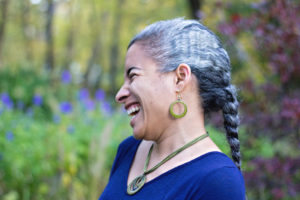 Do not kill the instinct of the body for the glory of the pose. Do not look at your body like a stranger but adopt a friendly approach towards it. Watch it, listen to it, observe its needs, its requests, and even have fun. To be sensitive is to be alive…
Do not kill the instinct of the body for the glory of the pose. Do not look at your body like a stranger but adopt a friendly approach towards it. Watch it, listen to it, observe its needs, its requests, and even have fun. To be sensitive is to be alive… My last post described yoga as a feeling practice. When I read this quote by Vanda Scaravelli many years ago it resonated deeply, and I began to explore the idea of the practice being “an unexpected delight.” The result is that my yoga mat has become a really fun place to be. A place to be tired and energized; a place to be terrified and gleeful; a place to struggle and a place to find ease; a place to laugh.
My last post described yoga as a feeling practice. When I read this quote by Vanda Scaravelli many years ago it resonated deeply, and I began to explore the idea of the practice being “an unexpected delight.” The result is that my yoga mat has become a really fun place to be. A place to be tired and energized; a place to be terrified and gleeful; a place to struggle and a place to find ease; a place to laugh.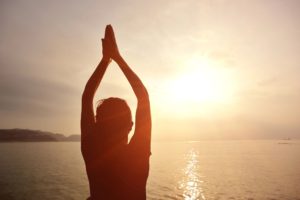
 The body is a sensory instrument. How much we miss when we don’t befriend it.
The body is a sensory instrument. How much we miss when we don’t befriend it.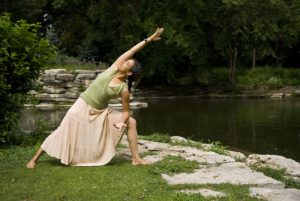
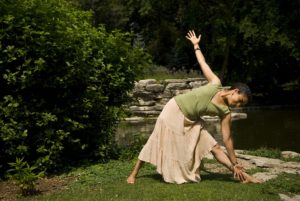
 If the mind really wants to get involved, you might occupy it with the question: “Is this pleasant or unpleasant?” or “What feels good about this pose?” Let the mind be in service to the experience rather than spiraling out with judgments, shoulds, associations, plans or other elements that aren’t directly related to the experience you’re having now. Of course that spiraling might still happen, and you have the choice to follow, or to do something different. Instead of jumping on the “thought train,” you could acknowledge the mind, give thanks that it can do what it does, and then gently direct your attention back to the sensory experience of the moment.
If the mind really wants to get involved, you might occupy it with the question: “Is this pleasant or unpleasant?” or “What feels good about this pose?” Let the mind be in service to the experience rather than spiraling out with judgments, shoulds, associations, plans or other elements that aren’t directly related to the experience you’re having now. Of course that spiraling might still happen, and you have the choice to follow, or to do something different. Instead of jumping on the “thought train,” you could acknowledge the mind, give thanks that it can do what it does, and then gently direct your attention back to the sensory experience of the moment.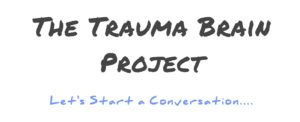 I recently had the honor of being on a panel of body-centered therapists following the reading of a play by Dayle Ann Hunt titled The Trauma Brain Project.
I recently had the honor of being on a panel of body-centered therapists following the reading of a play by Dayle Ann Hunt titled The Trauma Brain Project.
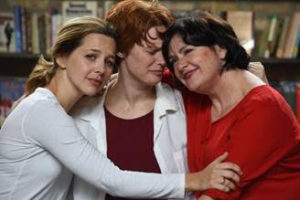
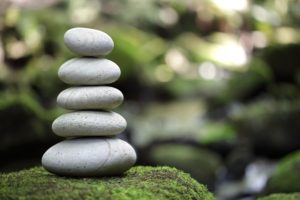 How are you feeling now? You can repeat that sequence one more time if you’re feeling a little more focused or settled than you were before you started.
How are you feeling now? You can repeat that sequence one more time if you’re feeling a little more focused or settled than you were before you started.